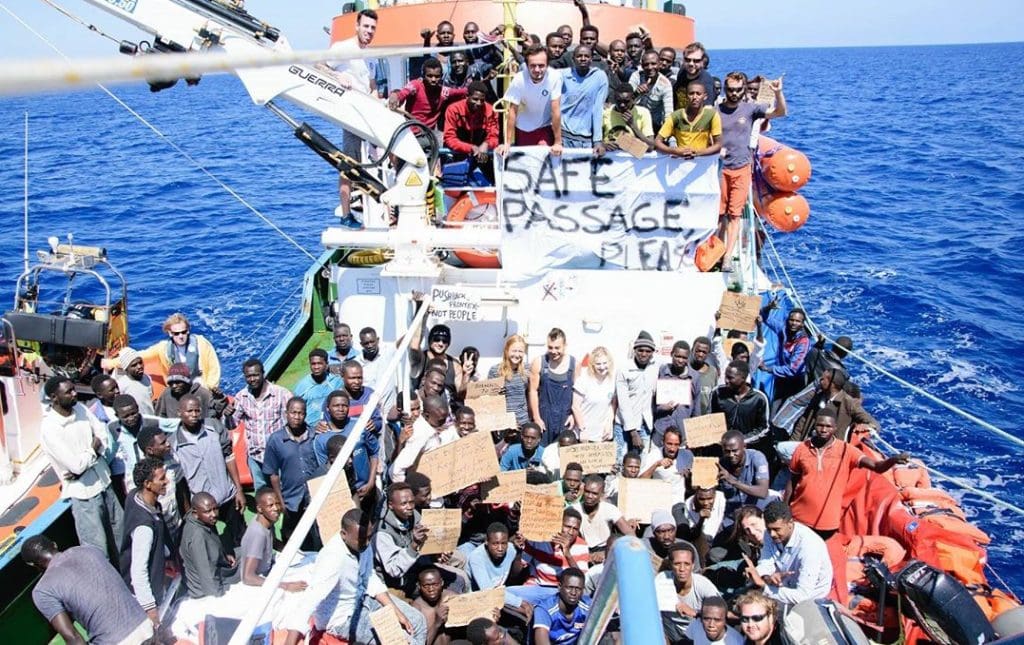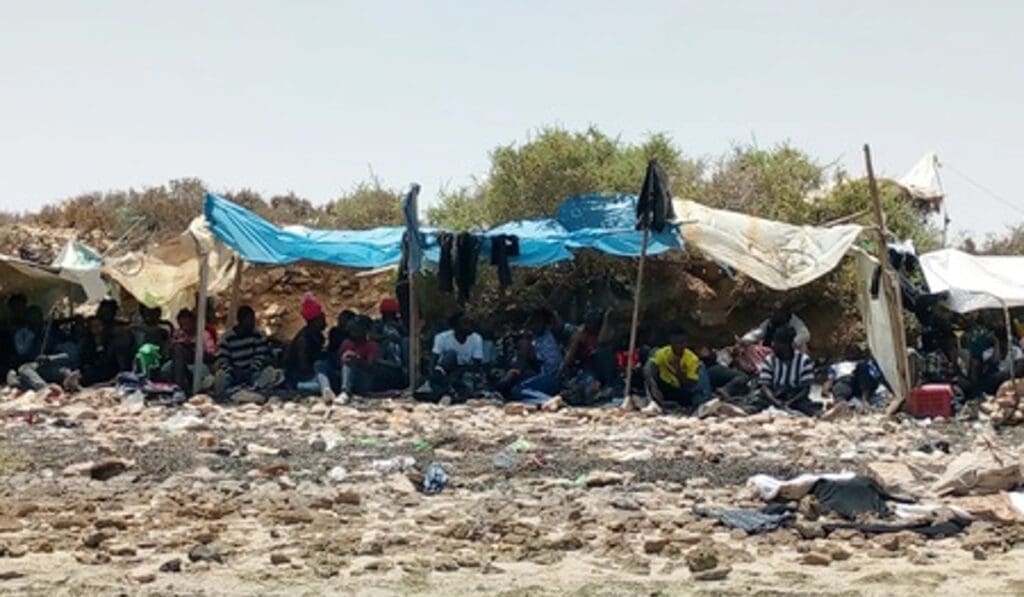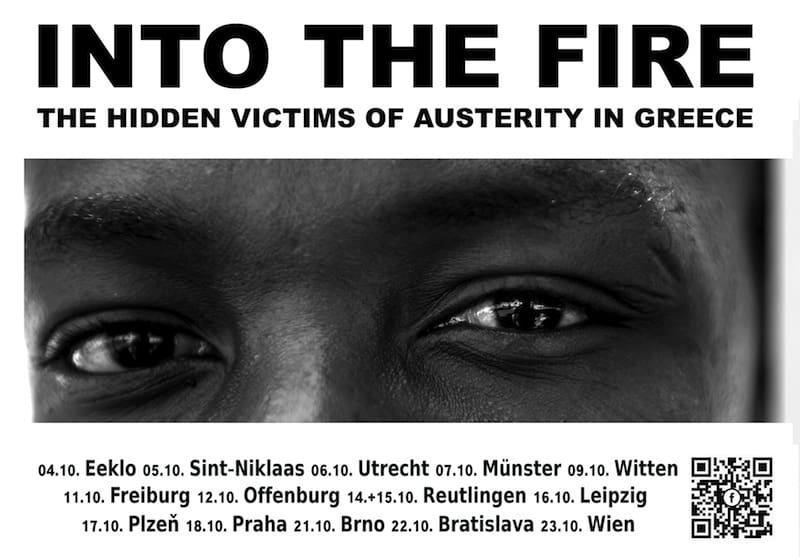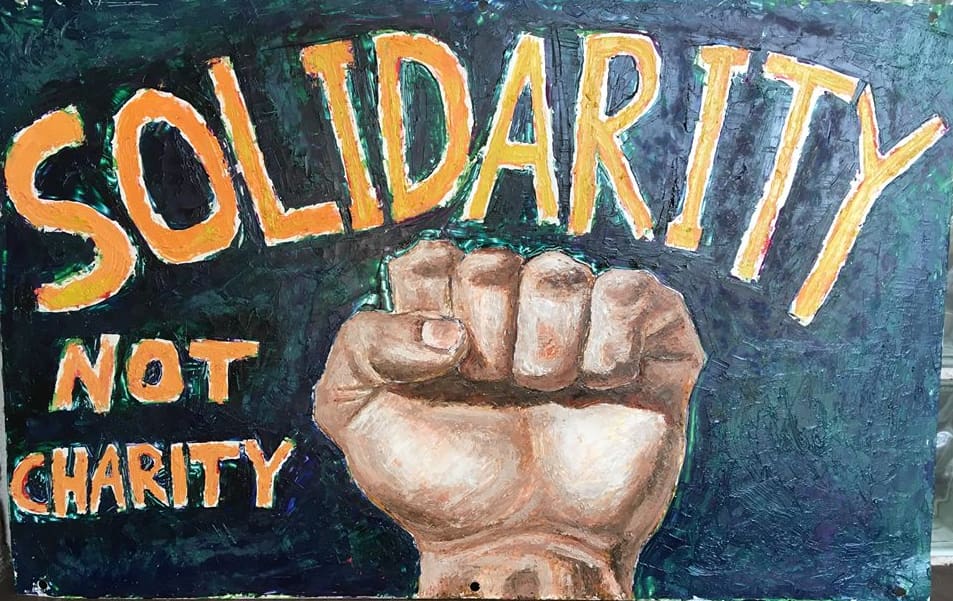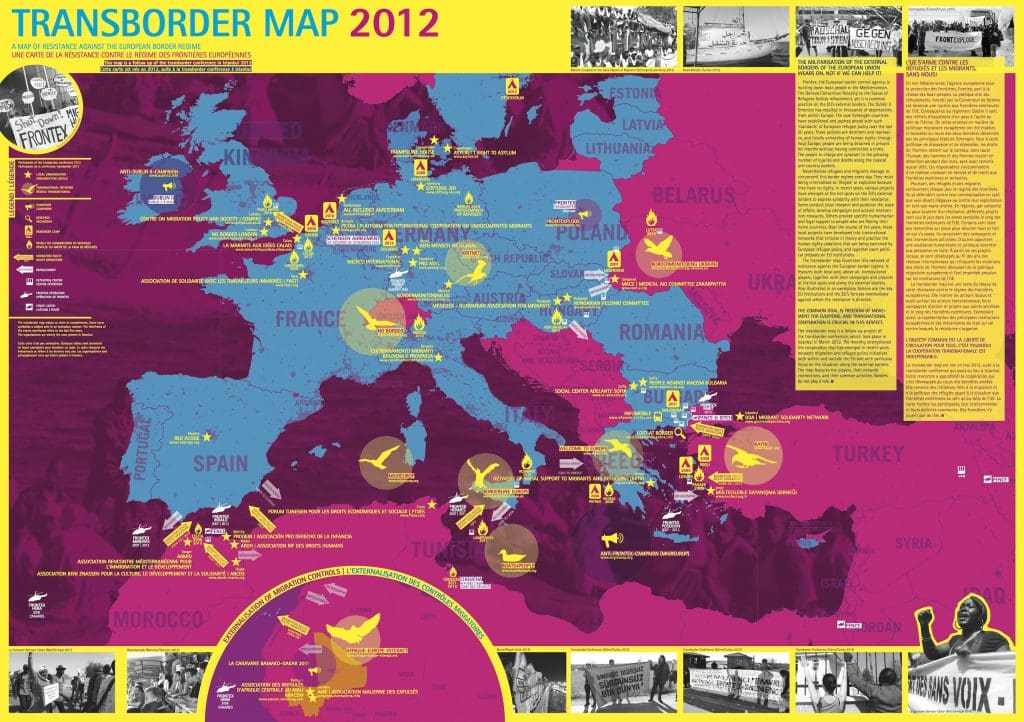AntiNote: Largely thanks to the parallel trial of Scott Warren and other No More Deaths humanitarians in Arizona, the news of yet another humanitarian worker being targeted for intense repression by border security-obsessed state forces in Europe has finally broken through in some Anglophone media. Pia Klemp has been involved in numerous sea rescues on the Mediterranean, notably in the absence of any “official” rescue operations, which began phasing out years ago as Fortress Europe elites approached the consensus that sea rescue is a “pull factor” for unwanted irregular migrants and refugees. Therefore, of course, autonomous rescue operations must also be criminalized and combated, and those who participate in them prosecuted—both to stop them as well as to stop those who might also consider doing or supporting such work.
What follows is a February 2019 interview with Pia Klemp as news of her now well-publicized prosecution was just coming to light, and then a March 2019 interview with Ruben Neugebauer, another member of the same humanitarian organization, Sea Watch, providing some further contextual information about the continuing massacre occurring on the Mediterranean.
Rescue work is resistance, as is migration itself. Solidarity with all people on the move, defying borders, and fighting for their futures—fighting for freedom. Safe passage now!
“The Charges are Vicious.”
Interview with Pia Klemp by Fabian Hillebrand for Neues Deutschland
2 February 2019 (original post in German)
Pia Klemp has rescued more than one thousand people from drowning. Now she is being investigated in Italy for allegedly abetting illegal immigration.
Fabian Hillebrand: Pia Klemp, you have rescued many people from the sea as captain of humanitarian vessels in the Mediterranean. Now you and other rescue workers are facing trial in Italy. Why?
Pia Klemp: The investigations are into allegations of abetting illegal immigration. There will be a hearing soon, where they will decide whether laptops and cellphones they confiscated from our ship in 2018 can be searched.
FH: How did you find out that you were being investigated?
PK: We heard about it in the Italian press. We don’t know where they got their information—presumably Italian officials leaked it. What’s especially disgusting about it is that full names, birth dates, and home addresses were released.
FH: In the course of the investigation it’s come to light that your ship had actually been bugged, for several months.
PK: Yeah, that was pretty unnerving; after all, we weren’t just working on the ship, we lived on it. When we found out that the ship had been bugged for months, that phone calls were being listened in on, that various authorities—among others Italian intelligence—were working against us, that there were informants on other ships…it was shocking to see how much time and effort state agencies were putting into combating sea rescues.
FH: What do you expect from your trial?
PK: The accusations against us are vicious. They’re talking about twenty years in prison and grotesque fines. This kind of trial typically drags on for years and costs an incredible amount of money. I don’t expect a conviction, though. The whole thing is obviously not a normal trial; it’s really a political show trial. Courts have already ruled many times that sea rescues are a legal imperative. There are a lot of precedents where there were the same charges, and the accused were all let off. The trial’s real purpose is to incapacitate us for a while—and to scare off other aid organizations.
FH: Since you’ve known about the investigation, you haven’t been back on board the rescue ship, is that right?
PK: Exactly—our lawyers advised us against further operations, in light of possible imprisonment in Italy. Absurd, right? We’re threatened with prison if we go back to saving people’s lives. It really took a lot for me to leave the bridge command in the first place. I’ve been on ships nonstop for the last seven years of my life; I’ve been all over the world, in all sorts of countries, on every continent and every ocean.
FH: You were born in Bonn and studied biology. How does someone like you end up seafaring?
PK: The ocean is in my heart. First I signed on with the ocean protection organization Sea Shepherd. I started there as an untrained deckhand, then at some point became a ship manager, doing more and more on the bridge, and gradually collected my hours and certifications in order to become a captain. Then when civilian rescue organizations started their activities in the Mediterranean, I knew I was needed there.
FH: It almost sounds like political concerns were your strongest motivation for going out to sea. Do you actually like seafaring?
PK: For me it’s a means to an end. I’ve never been out to sea just for fun, never just for a nice sailing trip or something. I have no interest in commercial shipping or that kind of work. For me it’s a vehicle for supporting what has to be done, whether that’s protecting the oceans themselves or responding to ocean emergencies. That said, yes, I do like sailing.
FH: In civilian sea rescue organizations, there seem to be a lot of landlubbers—people who may never have stepped foot on a boat before. As a captain, you’re responsible for these folks, and have to make a crew out of them.
PK: That’s true.
FH: How does that go? Are you recognized as an authority? Isn’t there a lot to teach?
PK: I’ve never had the feeling that anyone doubted my authority as a captain. Of course there are people who need to be shown how to do this and that; the crew consists of both trained and untrained folks, and yes, there are people who have never been on a boat. Media workers, for example, are constantly seasick because they’re always looking at the screens on their cameras. But our crew members really throw themselves into it, and they are usually professionals in their own fields. There are a lot of doctors who take a year off just to work with us. We turn them into sailors with training, by practicing maneuvers.
FH: It seems like female captains are rare. Do you ever get the side-eye?
PK: Of course seafaring is an extremely male-dominated world. But the people who sail on our ships don’t distinguish between men and women.
FH: Was there ever a moment that you were relieved to get a break from the hard work, from the constant rocking of the boat, because of the trial? Have you ever been secretly glad about returning to a normal life?
PK: Nope. In the Mediterranean we are constantly confronted with the consequences of European migration and asylum policies. People suffer and drown miserably. This is not a natural disaster, it is man-made. So I’ve never, not for one second, had the feeling that I should be happy not to be down there anymore. Quite the opposite: especially now, when there are so few rescue ships patrolling the Mediterranean, I’m aching to be able to keep contributing my skills, experience, and knowledge there.
FH: One of your former ships, the Sea Watch 3, recently had to wait many days until it—along with the dozens of refugees on board—was granted safe harbor. Have you experienced such a situation yourself?
PK: I’ve definitely been in situations where it took several days before we were granted port. In all this time we wouldn’t get a single response, not from Italy, Malta, or even Holland (whose flag we sail under)—no information at all. That was really staggering. We had a ship full of traumatized people, and a dead two-year-old boy in the freezer because we didn’t have any other storage for corpses on board but we don’t want to just leave them in the sea. It’s really awful how much more suffering people are condemned to simply because European states deny them rightful aid.
FH: What does the future hold for sea rescue? The Italian blockade of its ports doesn’t seem likely to be suspended. Is there a point at which you’ll have to admit that it’s just too dangerous for rescue workers and migrants alike?
PK: Well, as for the migrants, they don’t have many options. Either they drown at sea, or they get hauled back to internment camps by the Libyan so-called “coast guard,” which is really just a militia with different uniforms on, or they have to persevere on board civilian ships until Europe recognizes its duties under international law. The problem is the nonexistence of safe and legal routes of entry, where people could actually exercise their right to asylum. Escape across the Mediterranean remains the only way for many people to reach safety. As long as people are fleeing, we will try to rescue them. Nothing will change that; Matteo Salvini can throw all the temper tantrums he wants.
Pia Klemp first worked with the organization Sea Shepherd fighting against whaling fleets and the destruction of the oceans themselves. Moved by the tragedy on the Mediterranean, she turned to private sea rescues in 2015. In November 2017 she led the Sea Watch 3 on its first rescue mission off the Libyan coast. Since then, she and her crew have saved more than one thousand refugees from drowning. For this she is now under investigation. Solidarity at Sea is organizing solidarity for her and the other rescue workers facing prosecution (the “Iuventa 10”).
Translated by Antidote and presented with the permission of the interviewer.
* * *
The End of Operation Sophia: “The EU should accept migration as a fact.”
Interview with Ruben Neugebauer by Ann-Kathrin Büüsker for Deutschlandfunk
29 March 2019 (original post in German)
If the EU stops sending ships out on the Mediterranean as part of Operation Sophia, it will only lead to a shift in migration routes, Ruben Neugebauer of Sea Watch tells Deutschlandfunk. In light of the situation in Libya, people have no other option but to “get on these rafts.”
Ann-Kathrin Büüsker: The goal was and is to put a stop to human traffickers. Since 2015, European Union ships have been out on the Mediterranean under Operation Sophia in order to intercept smuggling vessels and reduce people-smuggling, as well as to rescue the people being smuggled. Operation Sophia has indeed been extended, but the EU plans to stop sending ships out, because they no longer have ports that will accept them. Italy continues to refuse refugees, because it hasn’t been determined how they will be distributed throughout Europe. Same for Malta. Party chair of the Greens in the European parliament, Ska Keller, sums up the consequences of the decision this way:
The end of Operation Sophia reminds us that there are no more sea rescues taking place on the Mediterranean—because the people who want to do them are no longer allowed to. NGO boats are no longer permitted to sail. And as for official state operations—the ones who are actually supposed to be doing sea rescues—there’s nothing happening there anymore either.
There’s the end of Operation Sophia, and then there’s the government in Rome refusing private aid organizations entry at Italian ports. What does this entail for the situation on the Mediterranean? I’m speaking with Ruben Neugebauer, one of the cofounders of the organization Sea Watch, a civic association which has operated several ships on the Mediterranean in recent years—private, organized refugee rescuers.
Mr. Neugebauer, if there are no more ships on the Mediterranean rescuing people, will that mean that fewer refugees will make the trip, and therefore fewer people will die?
Half a million people are trapped in Libya.
Ruben Neugebauer: No. It will simply shift the routes. We’re already seeing that. While for the last few years the main route on the Mediterranean has been through Libya (because in the absence of state structures it has been relatively easy for gangs of smugglers to send boats from there), now we’re already seeing a shift towards the Morocco-Spain corridor. Of course it works this way. If you’re fleeing a country like, for example, Nigeria, you think hard about which route to take. You’ve got your reasons for fleeing your home; at the same time it is well known what happens to people in Libya. Nonetheless, there are still over half a million people trapped in Libya, and we know what conditions are like there. It was the German foreign service, indeed, that compared the camps there to concentration camps, that wasn’t us.
It’s widely known what’s going on there. Yet another study just came out reporting on the fully systematic torture and abuse. So it’s totally clear: these people will try to escape, regardless of whether there are rescue ships or not. We saw this just last week—it was an interesting situation. Off the coast of Norway, there was a cruise ship in distress. Of course, rescue operations were initiated immediately, as they should be. The response included helicopters and ships, everything at hand, in order to get the passengers off the ship in distress and to safety—just as maritime law as well as morality demands. Simultaneously, though, there was a rubber raft with over forty people aboard that fell into distress in the central Mediterranean, and for more than a day, over twenty-four hours, there was absolutely no aid response. The position of the raft was known.
Of course people continue to attempt this journey in order to escape the horrific conditions in Libya—at the same time no one is going out to save them.
AB: When we look at the numbers that the UNHCR puts out, they say that the number of refugees coming over the Mediterranean has declined sharply. In 2018 it was only 117,000. And it was “only” 2,300 who drowned in 2018—even though that is an awful number, it was 3,100 in 2017. You could argue on this basis that when there are fewer rescue ships, there are fewer refugees.
There is a second mass grave, in the Sahara.
RN: First, we’ve got to consider these numbers in context. Right now we’re at a level similar to that of 2014. We’ve always had migration over the Mediterranean. It’s always been there in recent years. Of course there was a peak recently with the escalation of civil war in Libya, which affected the numbers. This was the case also in 2015, when a whole lot of people came over the Aegean (as is still happening now). At the same time—and this is according to the International Organization for Migration [IOM]—it is push-factors and not pull-factors that determine these numbers.
That’s the first thing. The other is quite simply a moral question. If we say we have to remove the rescue ships because then fewer people will try to cross, we could also argue for the abolition of mountain rescue. After all, the people they rescue are overwhelmingly people who put themselves at risk voluntarily, counting on someone to come and get them in the worst case. This argument would be wrong, and so is the argument that we should just let people drown in the Mediterranean.
If we really want it to stop—we don’t even know how the situation will develop from here, with climate change and so on. The European Union would do well to simply accept migration as a fact and deal with it as a fact, rather than trying to stop it. What we don’t see, of course, is that there is a second giant mass grave: the Sahara, where many more people die than on the Mediterranean, most likely. And there’s another development (this is from another study that just came out): the abuses in Libya against the people trapped there have increased massively.
AB: Let’s look at Libya again in a bit. I’d like to stay with the Mediterranean and Europe for now. You referred to the moral question as well as to European asylum policies, which brings us to the question of distribution. Italy argues, for example, that everything is being left up to them, because European asylum policies have failed and a fair placement system hasn’t been established. All the refugees that get picked up—rescued—in the Mediterranean have ended up in Italy. So the government in Rome has a point, doesn’t it?
Europe has been screwing Italy for years.
RN: I do believe that Salvini’s government is ultimately a consequence of the Dublin Regulation, for which the German government shares significant responsibility. So it’s a little cheap to blame only Italy. Of course what the Italian interior minister is doing is completely unacceptable. The prosecutor’s office in Rome is now rightly investigating Salvini for false imprisonment, because he wouldn’t let our ship—with many rescued on board—dock in Italy. We have to be clear: he broke the law.
At the same time, in a way it is possible to understand where Italy is coming from, to a point. Europe has been screwing Italy for years, and I think that the growing rightwing populist forces we’re seeing in Italy now are certainly a result of that.
AB: Another population feeling screwed right now is commercial shippers whose routes are on the Mediterranean. They’re afraid that they’ll ultimately be the only ones there to rescue refugees in distress. We just saw this yesterday: refugees ended up, well, capturing a ship that had taken them aboard, so that it would take them to Malta and not back to Libya. Do you think it’s realistic that commercial ships will be the only ones rescuing people on the Mediterranean?
RN: It’s definitely conceivable. It’s the same situation that we had before, because it’s not true that no one will come anymore if we just take away the rescue ships. What happened yesterday, as far as the refugees—for them, it’s nothing other than survival, self-defense. We know what happens in Libya. We know that since people can’t get out of Libya anymore, that those still there are getting wrung out by criminal gangs, that the abuses and atrocities there have increased massively. Obviously the people there want to get away, and obviously they don’t want to go back once they do!
Repatriations to Libya are human rights violations, and here we should have another look at Operation Sophia. They didn’t just now pull out their ships—they did that six months ago. They simply adjusted the language to reflect the human rights-violating practice they have been following for six months already. Namely: that refugee boats are detected by airplanes and then either the Libyan coast guard or nearby commercial ships will be alerted and instructed to return the people to Libya, in violation of their human rights.
What happened yesterday was that refugees protested on the ship, and the crew decided to sail to Malta instead of Tripoli. This was the crew making the right decision. Props to the crew of that commercial ship, who are the first and only in months to uphold human rights; they rescued people whose boat was in distress, as is their duty, and then—also in accordance with maritime law—brought them to safe harbor. Libya is not safe harbor. The crew did the right thing.
AB: People who come into distress on the Mediterranean have a right to be rescued.
You’ve argued that all of us in Europe know how bad the situation in Libya is. But don’t the refugees who more or less voluntarily end up in Libya from other places—don’t they also know that?
Once you’re in Libya, you can’t just change your mind and go back.
RN: Yes, that assumption is surely correct. The question is, however, how voluntary it really is, if you’ve been forced to flee for other reasons. It’s such a myth, to think that people are coming voluntarily. I’ve spoken with a lot of these people, and I’ve never met a single one on our ships who didn’t have a legitimate reason to leave. Whether this would be an officially recognized reason here is of course a completely separate question. Above all, what’s important, regardless of whatever reason they left, is that once you’re in Libya, you can’t just change your mind and go back. That’s something that a lot of people here don’t know. You can’t just go back out of Libya.
For example, we’ve had many people—this is really important, a lot of people don’t know this—who have come all the way from Bangladesh, and suddenly they’re sitting in these rafts. When we ask them whether they actually wanted to come to Europe, they say no, we’d rather go back to Bangladesh, but there’s no way out of Libya besides these boats. This is also something that plays into it. People who are already in Libya—and we can assume that there are well more than half a million—have basically no other option than to get in these rafts, and they are subject to such horrific conditions in Libya.
This is totally unacceptable, and it’s urgently necessary that these people have the option of a safe passage to Europe. We have a couple of ships available now, which aren’t being used for Operation Sophia anymore. The German government could easily use them to evacuate people from Libya, so they don’t have to use the rafts in the first place.
AB: Ruben Neugebauer, co-founder of the organization Sea Watch, a private sea rescuer in the Mediterranean. Thank you for the conversation this morning on Deutschlandfunk.
RN: My pleasure.
The views expressed by guests on Deutschlandfunk are their own.
Translated by Antidote
Featured image source: Solidarity at Sea (go there and donate to the Iuventa 10’s legal defense!)

